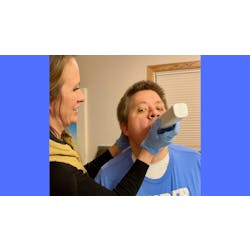By Dianne Watterson, RDH, BS, MBA
Dear Dianne,
I work in a small office with just the doctor and three staff members. The business assistant is always sticking her nose in my business. She asks personal questions that she shouldn’t be asking, such as how much money my fiancé makes. Sometimes she is quite rude to me, and I’ve had to bite my tongue to keep from telling her to mind her own business.
But what really steams me is when she questions decisions I make regarding patient care and often changes the time I need for subsequent appointments. I don’t like gossip, which is why I sometimes go and sit in my car at lunch just to get away from her. I haven’t said anything to the doctor, because I don’t think he would want to get involved.
She is very good with patients; they seem to love her. But I’m getting to the point that I do not want to be around her. Do you have any suggestions on how to deal with this nosy, rude person?
Valerie, RDH
Dear Valerie,
One of the pitfalls of working in a small office is the propensity of some people to pry into their coworkers’ lives. Some people live boring lives, so extracting some piece of juicy gossip about someone else gives that person a thrill. I much prefer working in a large office with a large cadre of coworkers. It seems there is less opportunity for busybodies and general nosiness.
I can understand your reluctance to confront your coworker. You don’t want to create a feeling of hostility in your small office, so up to this point, you have “put up” with her rudeness and nosey behavior.
However, since her behavior has become increasingly bothersome, it’s a safe assumption that you feel the pressure is building. If you are ever going to stop the behavior, you must deal with your coworker.
First, let’s talk about your coworker’s rudeness. Sometimes when people are rude to us, it takes us by surprise. We don’t know what to say immediately, but after we have time to process the rude comments, the typical reaction is anger.
Most of us do not wish to handle rudeness with rudeness. Here is a great reply that I learned from a speaker at a National Speaker Association meeting many years ago. (I wish I could remember who said this so I could give them attribution.) You could say, “That comment sounded rude to me. Was that your intention?” Believe it or not, some people do not know they are being rude. With this remark, you are letting the person know that she has been rude.
Another great comeback is to question the question with, “Why do you ask?” or “Why do you say this?” This forces the questioner to answer for their rude inquiry or statement.
When your coworker launches into some bit of gossip, the best thing you can do is to walk away. If she is addressing you directly, you can always say, “(Person’s name) is not here to defend herself, so it’s better if we change the subject.” I’ve used this: “You need to take this situation to the person who can do something about it, namely the person you are talking about.”
Another gossip-stopper is to engage in “positive gossip.” If your coworker says something negative about someone, you could offer something positive. It’s amazing how quickly this tactic disarms the gossiper. Here’s an example.
Gossiper: “I heard that Cindy’s son is having all kinds of problems at school, probably from problems at home...”
You: “Cindy was such a help to me the other day. She came and got my dirty instruments when she saw I was behind schedule. I really appreciated it.”
Now let’s talk about how to deal with the business assistant changing or reducing the amount of time you have requested for subsequent appointments. The next time it happens, you should confront her directly: “I scheduled (or requested you to schedule) six time units for this patient, so why did you change that to five?” Then let her answer. Then ask this question: “Then tell me what you would have me cut from the treatment plan in order to fit her care into five units? What part of her care would you have me eliminate?” You can probably tell that this problem hits one of my hot buttons. If a business assistant did this to the doctor, there is no doubt she would be verbally reprimanded and warned. I’d bet a pizza she wouldn’t dare do this to the doctor, so why does she think it’s permissible to question your treatment plan? It shows a blatant lack of respect for you and the patient. Since when do business assistants know or understand all the facets of care that have been planned for patients?
In a small office setting, it is important for people to work in harmony with each other. It’s like a small orchestra with each person playing a different instrument. Sometimes to achieve harmony, an instrument has to be “tuned.” Consider that dealing with negative behaviors in a definitive way is like tuning the instrument. After all, no one wants to hear a melody from an instrument out of tune.
Confronting your rude, nosey coworker might take you out of your comfort zone at first. However, I believe that people will only continue to treat you rudely if you allow it. You will earn her respect only if you stand up for yourself when the situation presents itself.
All the best,
DIANNE
The comeback
An article titled “12 Comebacks for Dealing with Rude People” (levo.com) gives us several good rejoinders to rude comments:
- Excuse me, but did you actually just say...
- So sorry, I wasn’t listening. Can you repeat that
- Right.
- Well, I think we’ve reached the end of this conversation.
- Whatever you say.
- You don’t really expect me to answer that, do you
- That’s the most pretentious thing I’ve ever heard. (Then laugh.)
- You’re kidding, right? Hold on. You are kidding, right
- Ouch. Did you mean to be that rude
- Help me understand why you think that was an appropriate thing to say, and why you think I should answer you.
- Thank you. We’re all refreshed and challenged by your unique point of view.
- My apologies. I don’t speak English. RDH
DIANNE GLASSCOE WATTERSON, RDH, BS, MBA, is an award-winning author, speaker, and consultant. She has published hundreds of articles, numerous textbook chapters, and two books. Dianne’s new DVD on instrument sharpening is now available on her website at wattersonspeaks.com under the “Products” tab. Visit her website for information about upcoming speaking engagements. Dianne may be contacted at (336) 472-3515 or by e-mail at [email protected].






